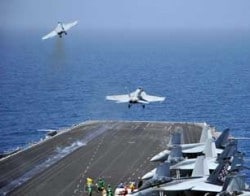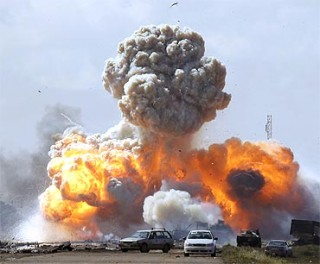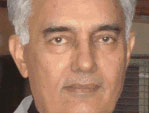By Air Commodore ® Khalid Iqbal

President Obama made a televised address from the National Defence University in Washington to explain why he took action against the forces of the Qaddafi regime that had begun attacking civilians for protesting against the regime. Those who drafted the Resolution 1973 based their case on a need to protect Libya’s civilians from attacks and facilitate dialogue between warring camps. Top Vatican official in Tripoli Bishop Martinelli has recently commented: “The air strikes are meant to protect civilians, but they are killing dozens of civilians;” he was reacting to killing of 46 civilians by the UN mandated bombers.
During the entire episode of diplomatic build up against Libya, Organization of Islamic Countries (OIC) was neither seen nor head. Arab League (AL) hurriedly suspended Libya’s membership and abdicated its leverage to resolve the crisis. It referred the matter to UN for military action against Libya in the form of enforcing a no-fly zone. No wonder spoilers promptly filled the void. UNSC resolution 1973 about Libya was poorly drafted by these opportunists. It is likely to set a horrible precedent in the name of vague terminologies like democracy, human rights, protection of civilians etc.
Going by the wording of resolution, almost all Arab states and most of the developing countries could qualify for foreign intervention under fuzzy pretexts. Such actions are poised to be selective. Atrocities committed in places like Gaza and Kashmir will continue to be pushed under the carpet.
Realizing the implications of the resolution, Arab support for military intervention wavered rather quickly. Alas! By then lamb had been handed over to wolves. It is not surprising that out of 21 AL members, only four attended the Paris summit convened for implementing the UN resolution. Qatar and the UAE are the only Arab states taking part in enforcing no-fly zone, both contributing just a token number of aircraft.
Resolution authorized UN member states to “take all necessary measures” to achieve these aims, but ruled out the

presence of foreign troops on Libya’s soil. However, the US ambassador to the UN later said that it would permit helping the rebel forces with weapons. Hence United States has found justification to train, arm and finance anti-Qaddafi insurgency, although some of the rebel leaders are affiliates of Al-qaeda and have fought against America in Afghanistan and Iraq.
The UN mandate of enforcement under Chapter 7, and related articles is meant to be exercised as a ‘last resort’. Russia and China questioned the merit of using force when other means had not been exhausted; this argument was also supported by Brazil and India. These four nations also pointed out the lack of clarity about who would enforce the measures.
Blitzkrieg style attack on Libya by the US, the UK and France surprised almost everyone because of the speed with which it was executed after authorization. Much before the passage of resolution, western media was abuzz with the speculations that foreign special operatives and logistic support units had already entered the Libyan soil clandestinely. NATO is well experienced in enforcing no fly zone; however, other attendant aspects of the mission and strategy are hazy. Libya is more than thirty times larger than Bosnia, where NATO implemented a no fly zone by employing around 240 aircraft from over ten countries.
A number of countries participating in the air campaign are of the view that they want an end to the rule of Qaddafi; whereas, this is not the language of the Resolution 1973. Moreover, a no fly zone could do little to impede Qaddafi’s land forces. One wonders how long this operation could comprise of exclusively air campaigns; Kosovo model may not hold good for Libya. Enforcing the UN mandate by air power alone will be impossible. Eventually, it would necessitate the commitment of ground troops.
Russian Prime Minister Vladimir Putin has recently observed that the concept of a “just war” can easily take on the aspect of a crusade. Wars on such pretexts are indeed a replica of the medieval notion of a ‘morally justified war’, which have since long been replaced with the model of ‘legal war’. UNO was precisely raised to prevent this kind of ‘just’ wars. Due to munitions of phenomenal destructive power at the disposal of intervening parties, such interventions end up in causing more casualties and destruction than what the repressive regimes, having relatively primitive means, could inflict on their own people.
Pakistan has termed the resolution as a sign of alarm. Pakistan is deeply concerned on the use of force against Libya and is of the opinion that a big crisis is in the offing in Arab region and Northern Africa. Iran has also expressed similar reservations.
Disagreement over the extent and limits of Libyan intervention indicates deep divisions within regional and global institutions and governments. A split UNSC vote of 10-0, with five abstentions indicates the lack of unanimity on the issue. Split within Europe is rather evident. Germany abstained from the resolution, refusing to participate in the operations and ‘calling any military operation folly that may go beyond air strikes’. Germany’s stance is by backed by Turkey. Brazil’s ambassador raised the prospect of the resolution “causing more harm than good” to the civilians intended to be protected. Similar considerations weighed on Arab League delegates when they debated the crisis in Cairo. They called for a no-fly zone in Libya, and nothing more. Arab League was opposed to any foreign intervention and wanted that no-fly zone “must end with the end of that crisis.”
Therefore, in case of prolonged, conflict, the frail cooperation among regional groupings could quickly meltdown on the pretext of violation of the UN parameters set for intervention. Although the UN authorization is based on the premise that civilians are under attack, the rebels are armed and an armed conflict is underway. The Libyan government has the right, as a sovereign nation, to put down the armed rebellion; though it certainly does not have the right to kill the unarmed innocent protesters.
China and Russia abstained and in a way extended tacit support to the move to launch an aggression against a sovereign country. Even though they may not be in favour of allowing invasion and occupation of Libya, now they may not be able to arrest or reverse this tendency. Islamic and other developing countries need to do effective lobbying with Moscow and Beijing to stall such move.
Pakistan is of the view that no country should be divided, fractured or brought under attack merely in the name of restoration of democracy, protection of human rights or safeguarding the civilians. Pakistan also rejects the trend of regime change through foreign intervention. Pakistan’s priority is stability and peace.
President John F Kennedy once quipped that limited military interventions are like taking a drink, once you take one and the effect wears off, you have to take another. American and British media are already referring to eastern Libya as ‘disputed territory.’ Forced partition of Libya would create yet another perpetual war zone.
In all probability, we are in for a long haul!

After graduating from college, I joined Pakistan Army and was commissioned in a Tank Regiment. I am a veteran of the Indo-Pakistan war. After leaving the Army, I joined IT as a profession. I was hired by Kuwait Air Force And Air Defence as an Adviser to computerize its entire operation. Here I was the Chief Coordinator of the Project, Kuwait Automated Support System (KASS). It was a state-of-the-art leading-edge technology where we established over 500 online terminals network with dedicated voice and data communications. It had Satellite linkups to connect with other systems and track the inventory movement for KAF & AD. On this project, I was coordinating with the US Navy, IBM World, AT&T, and Martin Marietta for the development, deployment, and operation of the KASS. Writing has always been a passion for me, been writing for 25 years for various newspapers and periodicals. Now for the last four years, I have formed my virtual Think Tank, Opinion Maker. Here we have some renowned writers from Pakistan and abroad who contribute regularly that’s helping the world opinion in some way. I am a keen golfer may not be a good one but play on a daily basis. I am also fond of using the camera to picture nature and people.
ATTENTION READERS
We See The World From All Sides and Want YOU To Be Fully InformedIn fact, intentional disinformation is a disgraceful scourge in media today. So to assuage any possible errant incorrect information posted herein, we strongly encourage you to seek corroboration from other non-VT sources before forming an educated opinion.
About VT - Policies & Disclosures - Comment Policy



